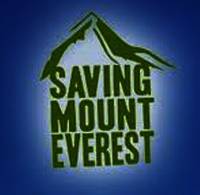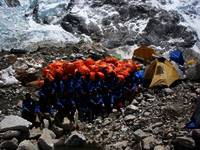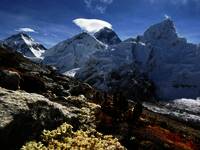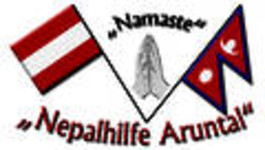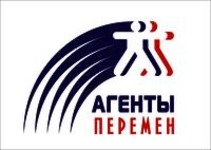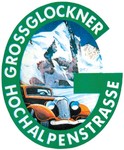Saving Mount Everest
Restoring Dignity to the Mountain: Liberating Mount Everest from Rubbish
Chomo lungma – Mother Goddess of the Universe, as she is known to the Tibetans.
Sagarmatha – so high that no bird can fly, as the Nepalese say
Mount Everest – the international name of the world’s highest summit.
However you call it, this matchless peak has awakened human longings and attracted mountaineers from all over the globe, as if by magic. Since the first successful summit expedition in 1953 the stream of visitors has grown and grown. In 1976, Sagarmatha National Park was established, as one of the first national conservation areas in Nepal; only three years later, UNESCO followed up by declaring it a World Natural Heritage. The Everest region soon developed into a major tourist destination. The steep increase in the numbers of visitors has entailed a considerable burden on the natural surroundings, including the emergence of a veritable mountain of rubbish, from Base Camp and up into the high ‘death zone’. Also the local Sherpa villages and lodges along the trekking routes lack sustainable, responsible approaches to dealing with waste.
Despite local concerns, Sagarmatha National Park still has no functional management system for its rubbish. Too many expeditions and trekking groups simply throw their discards into glacier crevasses; many of the local people are still unaware of how to deal properly with rubbish; and existing regulations and laws are not followed up in practice. The result? Mountains of rubbish, representing a threat to nature and health alike.
These are the pressing problems in focus in this project. We aim to use the occasion of Visit Nepal Year 2011 to draw wider attention to the importance of a new type of tourism – one that takes responsibility for the environment and is guided by criteria of sustainability.
The project Saving Mount Everest 2011–2012 (www.savingmounteverest.org) has as its over-arching goal the preservation and protection of the rich biodiversity of Nepal’s Sagarmatha National Park. An important contribution will come from the introduction and implementation of a management concept for rubbish and wastes. The initiative has come from the Sherpa people who work in tourism and are well aware of their responsibility. The residents of the entire Everest region will be involved, as the project approach builds on the leading role to be played by the local village communities. Structures will be established for self-management, in order to guarantee long-term sustainability for a cleaner environment.
Total project costs have been estimated at approximately 600 000 Euro, and more than two-thirds this sum have already been pledged. We still need more sponsors and partners, in order to bring the project Saving Mount Everest 2011–2012 to full completion, thereby guaranteeing sustainability for our efforts. Each and every donation represents an important contribution. We kindly ask that you offer support to this unique project, and thereby to the preservation of the World Natural Heritage Site, Mount Everest National Park!
Eco Himal, Society for Cooperation Alps-Himalaya, is coordinating this major international project. As explained on our website, we have more than twenty years of hands-on experience of environmental/developmental activity in the Everest region: we have brought electricity to the area as well as channelling clean drinking water, and with the establishment of the Khumbu Mountain Centre have also contributed to the cultural development of the national park. Most importantly: the local people know and trust us, and are keen to work together with us!
Financial support will come first and foremost from Swedish Postcode Lottery, from Hannes Snellman Attorneys Ltd., and from the EOG Association for Conservation. The government of Nepal will be responsible for part of the funding, as will the Nepal Mountaineering Association and the UNESCO World Heritage Centre in Paris. Technical and financial support will be forthcoming from the Austrian specialist firm UNTHA, who have placed three rubbish shredders at our disposal, and will also provide technical training of local personnel. To get the rubbish down from the mountain itself – and here we are talking of some 8 to 10 tonnes – the Everest Summiteers Association will provide assistance in the form of highly experienced Nepali mountaineers and expedition leaders. Also with us are the Research Centre of Waste and Resource Management of the Technical University of Vienna, and the Austrian Alpine Club. Notable Everest summiteers like Sir Chris Bonnington, David Breashears and Wolfgang Nairz have agreed to support the project as goodwill ambassadors.
Saving Mount Everest 2011– 2012 will begin in spring 2011 with a major clean-up campaign, and is set to finish in late 2012 with the implementation of a sustainable management concept for dealing with and avoiding waste.
For ‘Visit Nepal Year 2011’ the undisputed crown jewel of Nepal tourism – Mount Everest herself – will be more in the limelight than ever. This time not as ‘the world’s highest rubbish dump’ – but in focus through an exemplary project to restore dignity to this very special mountain, in line with the deeply held beliefs of Tibetan Buddhism that recognize the integrity of the landscape with life under the protection of the gods.
Our Saving Mount Everest project has been continued by other environmental activists. Our local partner and grass-root organisation Sagarmatha Pollution Control Committee (SPCC) is taking care of the solid waste management and in terms of awareness raising and in producing artwork from metal waste the initiative Sagarmatha Next has set a number of remarkable activities.
Project overview:
Sagarmatha next: From mountain waste to art and inspiration (PDF)
Video clip:
Welterbe Mount Everest Nationalpark - Das Leben der Sherpas im Wandel (in German)
Kontakt
EcoHimal Austria Gesellschaft für Zusammenarbeit Alpen-Himalaya
Hofhaymer Allee 11/17
5020 Salzburg
E-Mail: office@ecohimal.org
T: +43 662 829492
ZVR Zahl: 886266575



